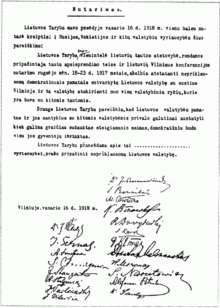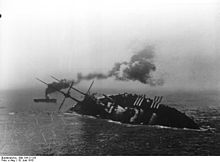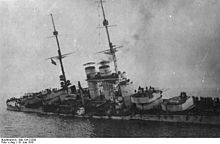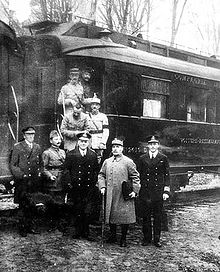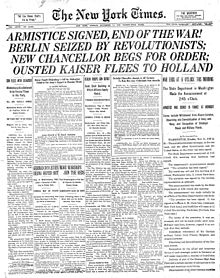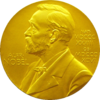
1918
Related subjects: Years
Background to the schools Wikipedia
This wikipedia selection has been chosen by volunteers helping SOS Children from Wikipedia for this Wikipedia Selection for schools. SOS Children is the world's largest charity giving orphaned and abandoned children the chance of family life.
| Millennium: | 2nd millennium |
|---|---|
| Centuries: | 19th century – 20th century – 21st century |
| Decades: | 1880s 1890s 1900s – 1910s – 1920s 1930s 1940s |
| Years: | 1915 1916 1917 – 1918 – 1919 1920 1921 |
| 1918 by topic: |
| Subject |
|
| By country |
|
| Leaders |
|
| Birth and death categories |
|
| Establishments and disestablishments categories |
|
| Works and introductions categories |
|
| Gregorian calendar | 1918 MCMXVIII |
| Ab urbe condita | 2671 |
| Armenian calendar | 1367 ԹՎ ՌՅԿԷ |
| Assyrian calendar | 6668 |
| Bahá'í calendar | 74–75 |
| Bengali calendar | 1325 |
| Berber calendar | 2868 |
| British Regnal year | 7 Geo. 5 – 8 Geo. 5 |
| Buddhist calendar | 2462 |
| Burmese calendar | 1280 |
| Byzantine calendar | 7426–7427 |
| Chinese calendar | 丁巳年十一月十九日 (4554/4614-11-19) — to — 戊午年十一月廿九日(4555/4615-11-29) |
| Coptic calendar | 1634–1635 |
| Ethiopian calendar | 1910–1911 |
| Hebrew calendar | 5678–5679 |
| Hindu calendars | |
| - Vikram Samvat | 1974–1975 |
| - Shaka Samvat | 1840–1841 |
| - Kali Yuga | 5019–5020 |
| Holocene calendar | 11918 |
| Igbo calendar | |
| - Ǹrí Ìgbò | 918–919 |
| Iranian calendar | 1296–1297 |
| Islamic calendar | 1336–1337 |
| Japanese calendar | Taishō 7 (大正7年) |
| Juche calendar | 7 |
| Julian calendar | Gregorian minus 13 days |
| Korean calendar | 4251 |
| Minguo calendar | ROC 7 民國7年 |
| Thai solar calendar | 2461 |
Year 1918 (MCMXVIII) was a common year starting on Tuesday (link will display the full calendar) of the Gregorian calendar and a common year starting on Monday of the 13-day-slower Julian calendar.
Events
Below, events of World War I have the "WWI" prefix.
January
- January 8 – Woodrow Wilson delivers his Fourteen Points speech.
- January 12
- January 15 – The keel of HMS Hermes is laid in Britain, the first purpose-designed aircraft carrier to be laid down.
- January 18 – Russian Constituent Assembly meets.
- January 19 – Russian Constituent Assembly proclaims Russian Democratic Federative Republic, but is dissolved by Bolshevik government on same day.
- January 25 – The Ukrainian People's Republic declares independence from Bolshevik Russia.
- January 27 – The Finnish Civil War begins.
- January – 1918 flu pandemic: "Spanish 'flu" (influenza) first observed in Haskell County, Kansas.
February
- February 5 – The SS Tuscania is torpedoed off the Irish coast; it is the first ship carrying American troops to Europe to be torpedoed and sunk.
- February 6 – Women's suffrage in the United Kingdom: Representation of the People Act gives most women over 30 the vote.
- February 14 – Russia switches from the Julian calendar to the Gregorian calendar; the date skips from February 1 to February 14.
- February 15 – Estonia, Latvia and Lithuania adopt Gregorian calendar.
- February 16 – The Council of Lithuania adopts the Act of Independence of Lithuania, declaring Lithuania's independence from the Russian Soviet Federative Socialist Republic.
- February 21 – The last captive Carolina Parakeet (the last breed of parrot native to the eastern United States) dies at the Cincinnati Zoo.
- February 24 – Estonian Declaration of Independence: After seven centuries of foreign rule, Estonia declares its independence from Russia. Armenia, Azerbaijan, and Georgia also declare their independence, but as the Transcaucasian Democratic Federative Republic.
March
- March 1 – WWI: German submarine U-19 sinks HMS Calgarian off Rathlin Island, Northern Ireland.
- March 3 – WWI: Germany, Austria-Hungary and Bolshevist Russia sign the Treaty of Brest-Litovsk, ending Russia's involvement in the war.
- March 6 – The Finnish Air Force is founded. The blue swastika is adopted as its symbol as a tribute to the Swedish explorer and aviator Eric von Rosen, who donated the first plane. Von Rosen had painted the Buddhist symbol on the plane as his personal lucky insignia.
- March 7 – WWI: Finland forms an alliance with Germany.
- March 12 – Moscow becomes the capital of Soviet Russia.
- March 19 – The United States Congress establishes time zones and approves daylight saving time (DST goes into effect on March 31).
- March 21– July 18 – WWI: Spring Offensive by the German Army along the Western Front fails to make a breakthrough despite large losses on each side, including nearly 20,000 British Army dead on the first day, Operation Michael.
- March 23
- WWI: The giant German cannon, the ' Paris Gun' (Kaiser Wilhelm Geschütz), begins to shell Paris from 114 km (71 mi) away.
- In London at the Wood Green Empire, Chung Ling Soo (William E. Robinson, U.S.-born magician) dies during his trick where he is supposed to "catch" two separate bullets – but one of them perforates his lung. He dies the following morning in a hospital.
- March 25
- The Belarusian People's Republic declares independence.
- Dr. Karl Muck, music director of the Boston Symphony Orchestra, is arrested under the Alien Enemies Act and imprisoned for the duration of WWI.
- The famous French composer Claude Debussy dies of colorectal cancer in Paris.
- March 27 – Bessarabia votes to become part of the Kingdom of Romania.
April
- April 1 – The Royal Flying Corps and the Royal Naval Air Service are merged to form the Royal Air Force.
- April 5 – Sālote succeeds as Queen of Tonga; she will remain on the throne until her death in 1965.
- April 21 – Manfred von Richthofen, "The Red Baron", WWI's most successful fighter pilot, dies in combat at Morlancourt Ridge near the Somme River.
- April 23 – Zeebrugge Raid attempts to seal off the German U-boat base there.
May
- May 1 – German troops enter Don Host Oblast; they take Rostov on May 6.
- May 2 – General Motors acquires the Chevrolet Motor Company of Delaware.
- May 11 – The Mountainous Republic of the Northern Caucasus is officially established.
- May 15
- End of the Finnish Civil War.
- The United States Post Office Department begins the world's third regular airmail service, between New York City, Philadelphia and Washington, D.C..
- May 16 – The Sedition Act of 1918 is approved by the U.S. Congress.
- May 20 – The small town of Codell, Kansas, is hit for the third year in a row on the same date by a tornado.
- May 21 – United States Army Aviation Section separated from Signal Corps and divided into the Division of Military Aeronautics and the Bureau of Aircraft Production.
- May 26 – The Transcaucasian Democratic Federative Republic is abolished. Georgia declares its independence as the Democratic Republic of Georgia.
- May 27 – The Third Battle of the Aisne commences.
- May 28 – Armenia and Azerbaijan declare their independence as the Democratic Republic of Armenia and the Azerbaijan Democratic Republic respectively.
June
- June 1 – WWI: The Battle of Belleau Wood begins.
- June 8 – Nova Aquila, the brightest observed since Kepler's of 1604, is discovered.
- June 10 – WWI: The Austro-Hungarian dreadnought battleship SMS Szent István is sunk by two Italian MAS motor torpedo boats off the Dalmatian coast.
- June 12
- Grand Duke Michael of Russia is murdered, thereby becoming the first of the Romanovs to be murdered by the Bolsheviks.
- WWI: First airplane bombing raid by an American unit in France.
- June 22 – Suspects in the Chicago Restaurant Poisonings are arrested, and more than 100 waiters are taken into custody, for poisoning restaurant customers with a lethal powder called Mickey Finn.
- June–August – " Spanish 'flu" becomes pandemic. Over 30 million people die in the following 6 months.
July
- July 3 – The Siberian Expedition is launched to extract the Czechoslovak Legion from the Russian Civil War.
- July 4 – Mehmed VI (1918–1922) succeeds Mehmed V (Resad) (1909–1918) as Ottoman Sultan.
- July 9 – Great Train Wreck of 1918: in Nashville, Tennessee, an inbound local train collides with an outbound express, killing 101.
- July 12 –, The Imperial Japanese Navy battle ship Kawachi blows up at Shunan, western Honshu, Japan, killing at least 621.
- July 13 – The National Czechoslovak Committee is established.
- July 15 – WWI – Second Battle of the Marne: The battle begins near the River Marne with a German attack.
- July 17
- Shooting of the Romanov family: By order of the Bolshevik Party and carried out by the Cheka, Tsar Nicholas II, his wife Alexandra Feodorovna, their children, Olga, Tatiana, Maria, Anastasia, and Alexei, and retainers are executed at the Ipatiev House in Ekaterinburg, Russia.
- WWI: RMS Carpathia is torpedoed and sunk off the east coast of Ireland by German submarine U-55; 218 of the 223 on board are rescued.
August
- August 1 – British anti-Bolshevik forces occupy Arkhangelsk.
- August 8 – WWI – Battle of Amiens: Canadian and Australian troops begin a string of almost continuous victories with a push through the German front lines. German General Erich Ludendorff later calls this the "black day of the German Army."
- August 10 – Russian Revolution: The British commander in Archangel is told to help the White Russians.
- August 21 – WWI: The Second Battle of the Somme begins.
- August 27 – Battle of Ambos Nogales: U.S. Army forces skirmish against Mexican Carrancistas and their German advisors at Nogales, Arizona, in the only battle of WWI fought on United States soil.
- August 30
- 20,000 London policemen strike for increased pay and union recognition.
- Russian Revolution: Vladimir Lenin is shot by Fanya Kaplan, but survives. Moisei Uritsky, the Petrograd head of the Cheka, is assassinated the same day.
September
- September – British armies and their Arab allies roll into Syria.
- September 5 – Kazan Operation begins. The event continues for 5 days and solidifies the Red Army's power in Russia over the White Army.
- September 11 – The Boston Red Sox defeat the Chicago Cubs for the 1918 World Series championship, their last World Series win until 2004.
- September 29 – WWI:
- Allied forces break through the Hindenburg Line.
- Bulgaria requests an armistice.
October
- October – Mammy Lou becomes the oldest person to ever star in a film, at age 114.
- October 3 – Kaiser Wilhelm II of Germany appoints Max von Baden Chancellor of Germany.
- October 3 – King Ferdinand I of Bulgaria abdicates in the wake of the Bulgarian military collapse in WWI. He is succeeded by his son, Boris III.
- October 4 – Wilhelm II of Germany forms a new more liberal government to sue for peace.
- October 8 – WWI: In the Forest of Argonne in France, U.S. Corporal Alvin C. York almost single-handedly kills 25 German soldiers and captures 132.
- October 9 – Landgrave Friedrich Karl of Hessen-Kassel is elected King of Finland.
- October 11 – Puerto Rico earthquake: The city of Mayagüez and adjacent towns are nearly destroyed by a 7.5 earthquake and a tsunami.
- October 12 – Cloquet Fire: The city of Cloquet, Minnesota, and nearby areas are destroyed in a fire, killing 453.
- October 18 – The Washington Declaration proclaims the independent Czechoslovak Republic.
- October 25 – The steamer Princess Sophia sinks on Vanderbilt Reef near Juneau, Alaska; 353 people die in the greatest maritime disaster in the Pacific Northwest.
- October 28
- Czechoslovakia declares its independence from Austria-Hungary.
- A new Polish government is declared in Western Galicia (Eastern Europe).
- October 29 – Wilhelmshaven mutiny of the German High Seas Fleet.
- October 30
- The Martin Declaration is published, including Slovakia in the formation of the Czecho-Slovak state.
- The Mutawakkilite Kingdom of Yemen is granted independence from the Ottoman Empire by the Armistice of Mudros.
- October 31 – The Hungarian government terminates the personal union with Austria, officially dissolving the Austro-Hungarian empire.
November
- November – The Allied fleet enters Constantinople.
- November 1
- Polish–Ukrainian War inaugurated by proclamation of the West Ukrainian People's Republic in Galicia with a capital at Lwów.
- Malbone Street Wreck: The worst rapid transit accident in world history occurs under the intersection of Malbone Street and Flatbush Avenue, in Brooklyn, New York City, with at least 93 dead.
- November 3
- WWI: Austria-Hungary enters an armistice with the Allies in Padua.
- Poland declares its independence from Russia.
- German Revolution: Sailors in the German fleet at Kiel mutiny and throughout northern Germany soldiers and workers begin to establish revolutionary councils on the Russian soviet model.
- November 4 – WWI: Austria-Hungary surrenders to Italy.
- November 6 – A new Polish government is proclaimed in Lublin.
- November 7 – King Ludwig of Bavaria flees his country.
- November 8 – The German army withdraws its support of the Kaiser.
- November 9
- Kaiser Wilhelm II of Germany abdicates and chooses to live in exile in the Netherlands.
- Provisional National Council Minister-President Kurt Eisner declares Bavaria to be a republic.
- British battleship HMS Britannia is sunk by a German submarine off Trafalgar with the loss of around fifty lives, the last major naval engagement of WWI.
- November 11
- WWI ends: Armistice with Germany (Compiègne): Germany signs an armistice agreement with the Allies between 5:12 AM and 5:20 AM in Marshal Foch's railroad car in Compiègne Forest in France. It becomes official on the 11th hour of the 11th day of the 11th month.
- Poland regains independence after 123 years of partitions. Józef Piłsudski is appointed Commander-in-Chief.
- Emperor Charles I of Austria gives up his absolute power but does not abdicate.
- November 12 – Austria becomes a republic.
- November 14
- Czechoslovakia becomes a republic.
- Józef Piłsudski is appointed head of state of Poland.
- November 16 – The Hungarian Democratic Republic is declared, marking Hungary's independence from Austria.
- November 18 – Latvia declares its independence from Russia.
- November 21 – Start of 3-day Lwów pogrom: Polish troops, volunteers and freed criminals massacre at least 320 Ukrainian Christians and Jews in Lwów in Galicia.
- November 22
- The Spartacist League founds the German Communist Party.
- The Belgian royal family returns to Brussels after the war, King Albert I having commanded the Allied Army group in the autumn Courtrai offensive which liberated his country.
- November 23 – British military government of Palestine begins.
- November 26 – The Podgorica Assembly votes for a "union of the people", declaring its union with the Kingdom of Serbia.
- November 28 – Estonian War of Independence: Russian SFSR forces invade Estonia, beginning the war. A Commune of the Working People of Estonia is established in Russian-occupied Narva the next day.
- November 29 – Serbia annexes Montenegro.
- November 30 – Ernest Ansermet conducts the first concert by the Orchestre de la Suisse Romande.
December
- December 1
- Iceland regains independence, but remains in personal union with the King of Denmark, who also becomes the King of Iceland until 1944.
- New voting laws in Sweden makes votes no longer dependent on taxable assets, each adult having one vote.
- The Union of Alba Iulia is proclaimed: Following the March 27 incorporation of Bessarabia and Bucovina, Transylvania unites with the Kingdom of Romania.
- The Kingdom of Serbs, Croats and Slovenes (which later becomes the Kingdom of Yugoslavia) is proclaimed.
- December 4 – President Woodrow Wilson departs by ship to the Paris Peace Conference, becoming the first United States President to travel to any foreign country while holding office.
- December 5 – The British light cruiser HMS Cassandra strikes a mine and sinks in the Gulf of Finland while aiding Estonia against the Bolsheviks, with eleven sailors killed.
- December 14 – Prince Frederick Charles of Hesse renounces the Finnish throne.
- December 16 – Vincas Mickevičius-Kapsukas declares formation of the Lithuanian Soviet Socialist Republic, a puppet state created by the Russian SFSR to justify the Lithuanian–Soviet War.
- December 20 – Tomáš Garrigue Masaryk returns to the Czechoslovak Republic.
- December 27 – Great Poland Uprising: The Poles in Greater Poland (or Grand Duchy of Poznań) rise up against the Germans.
- December 28 – Sinn Féin have a landslide victory in Irish seats in the United Kingdom general election, following the counting of votes, winning 73 of the 105 seats in Ireland. In accordance with their manifesto, Sinn Féin members will not take their seats in the Palace of Westminster but will form the First Dáil in Ireland. Countess Constance Markievicz, while detained in Holloway Prison (London), becomes the first woman elected to (but does not take her seat in) the British House of Commons.
- December 31 – A British-brokered ceasefire ends two weeks of fighting between Armenians and Georgians.
Date unknown
- The Grand Duchy of Baden ceases to exist.
- The Native American Church is formally founded.
- The Association Against the Prohibition Amendment is founded to promote repeal of prohibition in the United States.
- United Business Media is founded in London as United Newspapers Ltd.
Births
January–February
- January 1 – Patrick Anthony Porteous, Scottish recipient of the Victoria Cross (d. 2000)
- January 8 – Alma Ziegler, American female professional baseball player (d. 2005)
- January 10 – Arthur Chung, President of Guyana (d. 2008)
- January 15
- January 16
- January 17 – George M. Leader, American politician
- January 19
- January 20
- Juan García Esquivel, Mexican bandleader (d. 2002)
- Nevin S. Scrimshaw, American clinical
- January 21
- January 22 – Elmer Lach, Canadian ice hockey player
- January 23 – Gertrude B. Elion, American scientist recipient of the Nobel Prize in Physiology or Medicine (d. 1999)
- January 24 – Oral Roberts, American neo-Pentecostal televangelist (d. 2009)
- January 25 – Ernie Harwell, American baseball sportscaster (d. 2010)
- January 26
- January 27
- January 29 – John Forsythe, American actor (Dynasty) (d. 2010)
- February 1 – Dame Muriel Spark, Scottish author (d. 2006)
- February 2 – Hella Haasse, Dutch writer (d. 2011)
- February 3
- February 4 – Ida Lupino, English actress, screenwriter, director/producer (d. 1995)
- February 6 – Lothar-Günther Buchheim, German author (d. 2007)
- February 7 – Markey Robinson, Irish painter (d. 1999)
- February 8 – Fred Blassie, American professional wrestler and novelty singer (Pencil Neck Geek) (d. 2003)
- February 12 – Julian Schwinger, American physicist, Nobel Prize laureate (d. 1994)
- February 15 – Allan Arbus, American actor ( M*A*S*H)
- February 16 – Patty Andrews, American singer ( The Andrews Sisters) (d. 2013)
- February 17 – William Bronk, American poet (d. 1999)
- February 22
- February 25
- February 26
- Otis R. Bowen, American politician
- Theodore Sturgeon, American writer (d. 1985)
- February 28 – Alfred Burke, British actor d. 2011
March–April
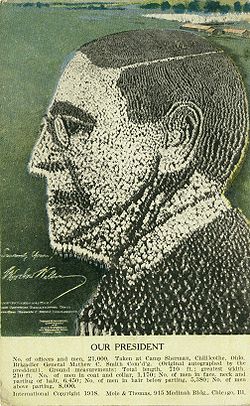
Image of President Woodrow Wilson created by 21,000 soldiers at Camp Sherman, Chillicothe, Ohio
- March 1
- March 3
- March 4 – Margaret Osborne duPont, former American female tennis player
- March 5
- March 9
- March 10 – Günther Rall, German ace fighter pilot (d. 2009)
- March 11 – Jack Coe, American evangelist (d. 1956)
- March 12 – Elaine de Kooning, American artist (d. 1989)
- March 15 – William McIntyre, Canadian Puisne Justice (d. 2009)
- March 16 – Frederick Reines, American physicist, Nobel Prize laureate (d. 1998)
- March 18 – Bob Broeg, American sports writer (d. 2005)
- March 20 – Jack Barry, American television game show host and producer (d. 1984)
- March 22 – Cheddi Jagan, President of Guyana (d. 1997)
- March 23 – Émile Derlin Zinsou, President of Benin
- March 25 – Howard Cosell, American attorney, lecturer, and sports journalist (d. 1995)
- March 29
- March 30 – Joseph Allen Jr., American actor (d. 1962)
- April 8 – Betty Ford, First Lady of the United States (d. 2011)
- April 9 – Jørn Utzon, Danish architect (d. 2008)
- April 16 – Spike Milligan, Irish comedian (d. 2002)
- April 17 – William Holden, American actor (d. 1981)
- April 18
- Gabriel Axel, Danish film director
- Shinobu Hashimoto, Japanese screenwriter
- Clifton Hillegass, American author, founder of CliffsNotes (d. 2001)
- April 20 – Kai Siegbahn, Swedish physicist, Nobel Prize laureate (d. 2007)
- April 22
- Mickey Vernon, American baseball player (d. 2008)
- William Jay Smith, American poet
- April 26 – Fanny Blankers-Koen, Dutch athlete (d. 2004)
- April 27 – John Rice, American baseball umpire (d. 2011)
May–June
- May 1 – Jack Paar, American television show host (The Tonight Show) (d. 2004)
- May 3 – Benjamin C. Thompson, American architect (d. 2002)
- May 4 – Kakuei Tanaka, former Prime Minister of Japan (d. 1993)
- May 9
- May 10
- T. Berry Brazelton, American pediatrician
- George Welch, American aviator (d. 1954)
- May 11 – Richard Feynman, American physicist, Nobel Prize laureate (d. 1988)
- May 12 – Julius Rosenberg, American-born Soviet spy (d. 1953)
- May 15
- May 16 – Wilf Mannion, English footballer (d. 2000)
- May 17
- A. C. Lyles, American film producer
- Birgit Nilsson, Swedish soprano (d. 2005)
- May 18 – Claudia Bryar, American actress (d. 2011)
- May 19 – Abraham Pais, Dutch-born American physicist (d. 2000)
- May 20 – Edward B. Lewis, American geneticist, recipient of the Nobel Prize in Physiology or Medicine (d. 2004)
- May 23 – Frank Mancuso, American major league baseball player and politician (d. 2007)
- May 27 – Yasuhiro Nakasone, Prime Minister of Japan
- May 30 – Károly Doncsecz, Slovenian potter (d. 2002)
- June 2 – Kathryn Tucker Windham, American writer and storyteller (d. 2011)
- June 4 – Johnny Klein, American drummer (d. 1997)
- June 6 – Edwin G. Krebs, American biochemist, recipient of the Nobel Prize in Physiology or Medicine (d. 2009)
- June 8 – Robert Preston, American actor (The Music Man) (d. 1987)
- June 9 – John Hospers, American philosopher (d. 2011)
- June 10 – Patachou, French singer
- June 15 – François Tombalbaye, former President of Chad (d. 1975)
- June 18
- Jerome Karle, American chemist, Nobel Prize laureate
- Franco Modigliani, Italian-born economist, Nobel Prize laureate (d. 2003)
- June 27 – Willy Breinholst, Danish humorist and writer (d. 2009)
July–August
- July 4
- July 5 – George Rochberg, American composer (d. 2005)
- July 6 – Sebastian Cabot, American actor (Family Affair) (d. 1977)
- July 9 – Jarl Wahlström, Salvation Army General (d. 1999)
- July 12 – Mary Glen-Haig, British Olympic fencer
- July 13 – Alberto Ascari, Italian race car driver (d. 1955)
- July 14 – Ingmar Bergman, Swedish film director (d. 2007)
- July 15 – Bertram Brockhouse, Canadian physicist, Nobel Prize laureate (d. 2003)
- July 16 – Bayani Casimiro, Filipino dancer and actor (d. 1989)
- July 17 – Carlos Manuel Arana Osorio, President of Guatemala (d. 2003)
- July 18 – Nelson Mandela, President of South Africa, recipient of the Nobel Peace Prize
- July 24 – Ruggiero Ricci, Italian-born violinist (d. 2012)
- July 25 – Jane Frank, American artist (d. 1986)
- July 26 – Marjorie Lord, American actress
- July 27 – Leonard Rose, American cellist (d. 1984)
- July 29 – Edwin O'Connor, American novelist and Pulitzer Prize for Fiction winner (d. 1968)
- July 31
- Paul D. Boyer, American chemist, Nobel Prize laureate
- Hank Jones, American pianist (d. 2010)
- August 3 – Sidney Gottlieb, American Central Intelligence Agency official (d. 1999)
- August 4 – Noel Willman, Irish actor (d. 1988)
- August 5 – Betty Oliphant, co-founder of National Ballet of Canada (d. 2004)
- August 8 – Brian Stonehouse, English painter and WWII spy (d. 1998)
- August 13 – Frederick Sanger, English biochemist, Nobel Prize laureate
- August 22
- August 25 – Leonard Bernstein, American composer and conductor (d. 1990)
- August 26 – Hutton Gibson, religion writer and father of actor Mel Gibson
- August 27 – Jelle Zijlstra, Dutch politician, Prime Minister of the Netherlands from 1966 until 1967 (d. 2001)
- August 30 – Ted Williams, American baseball player (d. 2002)
September–October
- September 3 – Helen Wagner, American soap opera actress (d. 2010)
- September 4
- Paul Harvey, American radio broadcaster (d. 2009)
- Gerald Wilson, American jazz trumpeter
- September 8 – Derek Barton, British chemist, Nobel Prize laureate (d. 1998)
- September 9 – Oscar Luigi Scalfaro, 9th President of the Italian Republic
- September 13 – Rosemary Kennedy, sister of President of the United States John F. Kennedy (d. 2005)
- September 15 – Nipsey Russell, American comedian (d. 2005)
- September 17 – Chaim Herzog, 6th President of Israel 1983–93 (d. 1997)
- September 21 – John Gofman, American Manhattan Project scientist and advocate (d. 2007)
- September 22 – Henryk Szeryng, Polish-born violinist (d. 1988)
- September 27 – Martin Ryle, English radio astronomer, recipient of the Nobel Prize in Physics (d. 1984)
- September 28
- October 4 – Kenichi Fukui, Japanese chemist, Nobel Prize laureate (d. 1998)
- October 6 – Goh Keng Swee, former Deputy Prime Minister of Singapore (d. 2010)
- October 8 – Jens Christian Skou, Danish chemist, Nobel Prize laureate
- October 9 – E. Howard Hunt, Watergate break-in coordinator (d. 2007)
- October 17 – Rita Hayworth, American actress (d. 1987)
- October 18
- Konstantinos Mitsotakis, former Greek Prime Minister
- Bobby Troup, American singer-songwriter and actor (Emergency!) (d. 1999)
- October 19
- Louis Althusser, French philosopher (d. 1990)
- Robert S. Strauss, Democratic National Committee Chairman
- October 23 – Augusta Dabney, American actress (d. 2008)
- October 27
- October 31 – Ian Stevenson, American parapsychologist (d. 2007)
November–December
- November 3
- November 4
- November 7 – Billy Graham, American evangelist, spiritual adviser to several U.S. Presidents
- November 9 – Spiro Agnew, American Vice President (d. 1996)
- November 10 – Ernst Otto Fischer, German chemist, Nobel Prize laureate (d. 2007)
- November 13 – Jack Elam, American actor (d. 2003)
- November 21 – Dorothy Maguire Chapman, American professional baseball player (d. 1981)
- November 29 – Madeleine L'Engle, American author (d. 2007)
- November 30 – Efrem Zimbalist, Jr., American actor (The FBI)
- December 8 – Gérard Souzay, French baritone (d. 2004)
- December 9 – Jerome Beatty, Jr., author of children's literature (d. 2002)
- December 11 – Aleksandr Solzhenitsyn, Russian writer, Nobel Prize laureate (d. 2008)
- December 12 – Joe Williams, American jazz singer (d. 1999)
- December 15 – Jeff Chandler, American actor (d. 1961)
- December 20 – Joseph Payne Brennan, American poet/author (d. 1990)
- December 21
- December 23
- José Greco, Italian-born flamenco dancer (d. 2001)
- Helmut Schmidt, Chancellor of Germany
- December 25
- Bertie Mee, English football player and manager (d. 2001)
- Anwar Sadat, President of Egypt, recipient of the Nobel Peace Prize (d. 1981)
Deaths
January–June
- January 6 – Georg Cantor, German mathematician (b. 1845)
- January 8
- January 9
- January 28 – John McCrae, Canadian soldier, surgeon and poet (b. 1872)
- February 2 – John L. Sullivan, American boxer (b. 1858)
- February 5 – Leonard Monteagle Barlow, British fighter pilot (b. 1898)
- February 6 – Gustav Klimt, Austrian painter (b. 1862)
- February 10 – Ernesto Teodoro Moneta, Italian pacifist, Nobel Prize laureate (b. 1833)
- February 15 – Vernon Castle, American dancer (b. 1887)
- February 23 – Adolphus Frederick VI, Grand Duke of Mecklenburg-Strelitz (b. 1882)
- March 9 – Frank Wedekind, German playwright (b. 1864)
- March 10 – Jim McCormick, Scottish-born American baseball player (b. 1856)
- March 13 – César Cui, Lithuanian composer (b. 1835)
- March 14 – Lucretia Garfield, Wife of President James Garfield (b. 1832)
- March 23 – T. P. Cameron Wilson, English poet and novelist (b. 1888)
- March 25
- March 27
- April 1 – Isaac Rosenberg, British war poet (b. 1890)
- April 5 – King George Tupou II of Tonga (b. 1874)
- April 20 – Karl Ferdinand Braun, German phyicist, Nobel Prize laureate (b. 1850)
- April 21 – Manfred von Richthofen, German fighter pilot (b. 1892)
- April 28 – Gavrilo Princip, Yugoslav assassin (b. 1894)
- May 2 – Jüri Vilms, Estonian politician (b. 1889)
- May 14 – James Gordon Bennett, Jr., American newspaper publisher (b. 1841)
- May 19 – Raoul Lufbery, Franco-American fighter pilot (b. 1885)
- May 25 – József Kiss, Austro-Hungarian fighter pilot (b. 1896)
- May 30 – Georgi Plekhanov, Russian revolutionary and philosopher (b. 1856)
- June 1 – Roderic Dallas, Australian fighter pilot (b. 1891)
- June 4 – Charles W. Fairbanks, Vice President of the U.S. (b. 1852)
- June 10 – Arrigo Boito, Italian poet and composer (b. 1842)
- June 12 – Grand Duke Michael Romanov (b. 1878)
- June 19 – Francesco Baracca, Italian fighter pilot (b. 1888)
- June 27 – Joséphin Péladan, French occultist (b. 1858)
July–December
- July 3 – Sultan Mehmed V of the Ottoman Empire (b. 1844)
- July 9 – James McCudden, British fighter pilot (b. 1895)
- July 14 – Quentin Roosevelt, youngest son of President Theodore Roosevelt, killed in action as fighter pilot (b. 1897)
- July 17
- Tsar Nicholas II of Russia (b. 1868)
- Tsaritsa Alexandra Feodorovna of Russia (b. 1872)
- Grand Duchess Olga Nikolaevna of Russia (b. 1895)
- Grand Duchess Tatiana Nikolaevna of Russia (b. 1897)
- Grand Duchess Maria Nikolaevna of Russia (b. 1899)
- Grand Duchess Anastasia Nikolaevna of Russia (b. 1901)
- Tsarevich Alexei Nikolaevich of Russia (b. 1904)
- July 20 – Francis Lupo, American soldier (b. 1895)
- July 22 – Indra Lal Roy, Indian fighter pilot (b. 1898)
- July 26 – Edward Mannock, British fighter pilot (b. 1887)
- July 29 – Ernest William Christmas, Australian painter (b. 1863)
- July 30
- July 31 – George McElroy, British fighter pilot (b. 1893)
- August 1
- August 6 – Peter Strasser, German naval officer and airship commander (b. 1876)
- August 10
- August 12 – Anna Held, French actress (b. 1873)
- August 18 – Henry Norwest, Canadian sniper (b. 1884)
- September 12 – George Reid, 4th Prime Minister of Australia (b. 1845)
- September 16 – Maurice Boyau, French World War I fighter ace (b. 1888)
- September 27 – Fritz Rumey, German World War I fighter ace (b. 1891)
- September 28
- September 29 – Frank Luke, American fighter pilot (b. 1897)
- October 5
- October 9 – Raymond Duchamp-Villon, French sculptor (b. 1876)
- October 11 – Wallace Lloyd Algie, Canadian soldier (b. 1891)
- October 15 – Sai Baba of Shirdi, Indian guru and yogi (b. 1838)
- October 19 – Harold Lockwood, American actor (b. 1887)
- October 22 – Myrtle Gonzalez, American actress (b. 1891)
- October 28 – Michel Coiffard, French World War I fighter ace (b. 1892)
- October 29 – Rudolf Tobias, Estonian composer (b. 1873)
- October 31 – Egon Schiele, Austrian artist (b. 1890)
- November 2 – Hugh Cairns, Canadian soldier (b. 1896)
- November 4
- November 6 – Alan Arnett McLeod, Canadian soldier (b. 1899)
- November 9
- November 11 – George Lawrence Price, Last Commonwealth soldier to die in WWI (b. 1892)
- November 19 – Joseph Fielding Smith, American Mormon leader (b. 1838)
- December 2 – Edmond Rostand, French writer (b. 1868)
- December 11 – Ivan Cankar, Slovenian writer (b. 1876)
- December 14 – Sidónio Pais, 4th President of Portugal (b. 1872)
- December 28 – Olavo Bilac, Brazilian poet (b. 1865)
Nobel Prizes
- Physics – Max Karl Ernst Ludwig Planck
- Chemistry – Fritz Haber
- Medicine – not awarded
- Literature – not awarded
- Peace – not awarded
